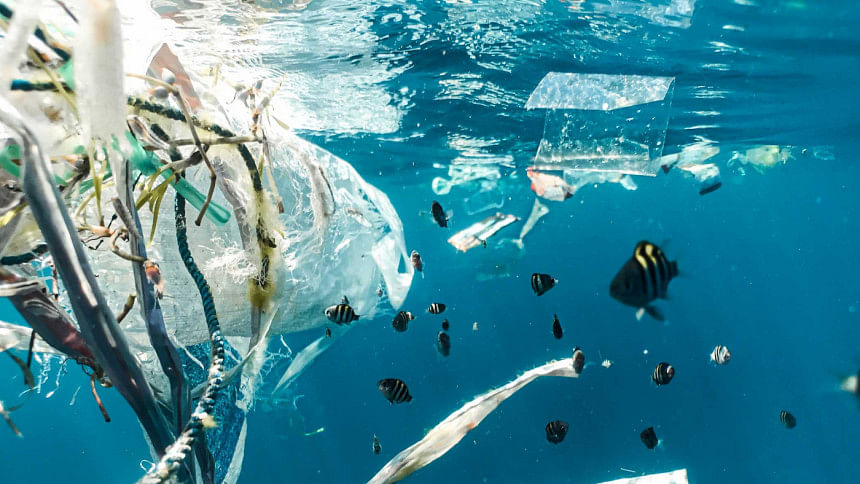A case for mindful consumption in a mindless era

Traditionally, Bangladeshis have been a sustainability-minded nation, despite the fact that the branding of "sustainability" per se has never really been applied to us. One can certainly relate to the experience of pulling out a box of ice cream from the fridge, only to discover a solid block of ginger paste inside the container. Sturdy plastic cartons were not thrown out, rather repurposed to serve other functions. Similarly, old sarees were given a new life as patchwork quilts, which again lasted for years. Traditionally, our practice has been to shun waste. "Reusing" or "repurposing" are concepts that we have practised for decades, perhaps centuries.
But in recent times, all indicators point to an exponential rise in the consumption culture in Bangladesh, leading to a nonchalant adoption of wastefulness. Increasing purchasing power continues to fuel the need to consume more. All of this is great, but that one nagging fact remains: the irresponsible consumption pattern is wreaking havoc on the environment as recklessly disposed used products or packaging materials continue to pile up. The culture of mindfulness is being fast replaced by one of wastefulness. And there's no stopping it!
According to a UNB report, the Department of Environment (DoE) says that 1,700 tonnes of plastic waste are produced in Bangladesh every day. A stroll down a Dhaka street would apprise one of the reasons for such a plastic explosion. Food of every kind, ranging from crisps to cakes, all packaged in colourful plastic packets, adorn the shop fronts of every small retailer lining the city streets. It is the same scenario everywhere else in the country. One must also mention the ingenious business model of the giant fast-moving-consumer-good multinational companies, who successfully made personal care products financially accessible to the mass population through the introduction of mini packs several decades ago. Imagine the volume of plastic that goes into producing the millions of plastic sachets meant for single use. Despite flaunting excellent practices of sustainability, these giant companies don't shy away from continuously spewing out plastic containers for their products that help them earn millions in revenue from the bottom of the pyramid population.
Yet, another alarming area is the increasingly voracious appetite for imported products. While the occasional dabbling in eating imported fruit might seem harmless, one needs to be educated on the concept of greenhouse gases (GHGs) released into the atmosphere by the various vehicles ploughing the oceans and land to get that fruit to one's table. Imagine the volume of GHGs emitted for feeding people who make a habit of consuming products grown on the other side of the planet on a regular basis.
Clearly, in the name of making progress, we as a nation are taking hundreds of steps backwards. Not only are we murdering the natural habitats, but in the process, we are also encouraging the development of a generation of non-empathising individuals indulging in mindless consumption, with zero understanding of (or care for) sustainable living. The saddest part is that it's the opposite of how our culture has traditionally been. This particular aspect of evolution towards progress is undoubtedly toxic.
The good news, however, is that there are small pockets of conscious citizens who are doing their part, however small, to make a positive impact on the environment. Just carrying a reusable bag while going shopping can make a lot of difference. Replacing meat in one meal with vegetables can reduce GHG emissions associated with rearing farm animals. Opting for locally grown food instead of imported ones also plays a big role in reducing carbon footprint. Reusing sturdy plastic boxes as food containers or even cabinet organisers can be a great way to be sustainable as well.
Institutions can explore ways of packaging in more environment-friendly ways and reward customers for returning packaging materials to recycling facilities. Innovations such as sanitary napkins made of water hyacinth should be subsidised and promoted, and encouraged to be extended towards the production of other materials. A diaper, for instance, takes about 500 years to fully decompose. That creates an opportunity for extending the sanitary napkin research to diaper research on a large scale.
While it is tempting to get swept away in the tide of progress, one must reflect on what exactly that entails. Getting submerged in pollution of every kind while enjoying a seemingly improving standard of living is nothing short of appalling. The trend needs to be reversed. It's high time we as a nation looked back at our innate ability of conserving—and perhaps did so with more mindfulness. Whereas, in the past, conserving was just a means of being less wasteful, today we have to do so with the mindset of being more responsible for the sake of our planet. Responsible consumption needs to be ingrained. The values of the bygone eras need to be brought back to practice and, if necessary, reinforced through incentives. Otherwise, we will just continue to hurtle down a tunnel of doom in the name of progress.
Narmin Tartila Banu is a senior lecturer at North South University (NSU), pursuing a PhD at Carleton University in Canada.

 For all latest news, follow The Daily Star's Google News channel.
For all latest news, follow The Daily Star's Google News channel. 



Comments